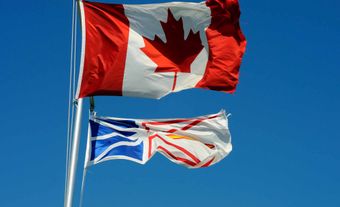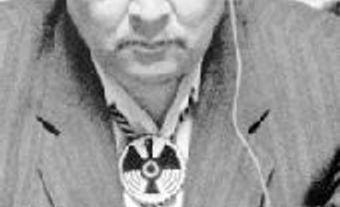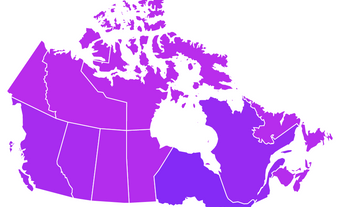Cet article a été initialement publié dans le magazine Macleans (01/07/1995)
Perhaps it should have been surprising. After all, it has been fashionable so far this year to elect Conservative provincial governments, with Tories winning in Manitoba and Ontario. Saskatchewan last week bucked that trend, handing a resounding majority victory to Roy Romanow's New Democratic Party. Still, the result was predictable. The NDP led in opinion polls from the outset of the 28-day campaign. And in the June 21 vote, it captured 42 of the legislature's 58 seats in a sweep so decisive that television commentators declared a Romanow victory just 14 minutes after the polls closed. Lynda Haverstock's Liberals won 11 seats to become the official Opposition - ending nearly two decades in the political wilderness. And the Conservatives, led by Bill Boyd, pulled up the rear with just five seats. Some analysts last week pointed out that Saskatchewan is often out of political step with the rest of the country because of its long tradition of NDP governments. Others suggested that the decisive factor was that voters simply felt no need for change. Romanow, after all, has already done what many conservatives elsewhere are only now promising - eliminate his province's budget deficit.
Certainly, Romanow campaigned on his fiscal record. Grant Devine's Conservative government left behind an $842-million deficit in 1991, the year the New Democrats came to power. Romanow imposed tax hikes on everything from retail sales to cigarettes, and imposed spending cuts that included closing 52 rural hospitals and turning them into health clinics. And in 1994-1995, with the help of booming natural-resource revenues, his government finally posted a budget surplus of $119 million. Both Opposition leaders criticized the premier for bungling the hospital closures, and promised tax cuts and deep reductions in the size of government. But their messages failed to capture voters' imaginations. In fact, only about 64 per cent of eligible voters cast their ballots last week - down dramatically from 83 per cent in 1991. With an NDP victory all but assured, the only real contest was for second place, and that was not enough to spark much electoral enthusiasm. "When someone's going to be dethroned, you can really tell, and that generates a lot of excitement," observed Gladys Johnston, a clerical worker from Moose Jaw who voted for the NDP. "But this election was pretty flat." Johnston said she saw little alternative to Romanow's government. "The Conservatives scared us with their past," she said. "And the Liberals were offering pie-in-the-sky. I think we've been around long enough to know that there aren't any easy answers."
Devine's fiscal record certainly did little to boost the prospects of the current Tory leader. But Boyd had even heavier baggage to carry: a dozen former Conservative MLAs are facing fraud and breach-of-trust charges. But Boyd - who kept referring to his party as "the new PCs" - was credited with running a focused, right-wing and fairly effective campaign. He pledged to cut government, introduce work for welfare, allow private health care and tax status Indians who live off reserves. The Tories lost half of the 10 seats they won in 1991. But the fact that they managed to keep a toe-hold in the legislature despite their considerable troubles was widely considered a respectable showing. "A lot of people expected to be writing the obituary for the Progressive Conservatives in Saskatchewan," Boyd said. "And we have clearly shown they are wrong."
If nothing else, the Tories did well enough to cause trouble for the Liberals. The Grits had talked about winning 18 to 20 seats in the days leading up to the election. But they ended up splitting the anti-NDP vote with the Tories. They also had difficulty articulating their campaign message. After releasing an 81-page policy document as the campaign began, Haverstock spent much of the next two weeks explaining and defending the figures in her fiscal plan - including a projected eight-per-cent economic growth rate - to skeptical audiences. The Liberals also promised to cut Saskatchewan's nine-per-cent sales tax by four points over four years. And Haverstock said she could have found enough efficiencies in government - including amalgamating and eliminating whole departments where necessary - to compensate for the tax cuts she promised. But it was a hard sell. Robin Bellamy, the defeated Liberal candidate in Saskatoon/Sutherland riding, thought the tax cut was practical. But, he acknowledged, "going door-to-door, so many people told me, 'It just can't be done.' "
For all that, the Liberals did win about 35 per cent of the popular vote, and Haverstock argued that it should have translated into more seats for her party. She claimed that redistribution - constituency boundaries were redrawn during the last term, and the number of seats in the legislature was cut from 66 to 58 - disproportionately hurt her party. Some of the Liberals who showed up for her election-night speech in Saskatoon, though, grumbled that Haverstock herself must shoulder at least part of the blame for their showing. Haverstock's supporters countered that the Liberals have not held power since 1971, have not served as the Opposition since 1978, and have elected only one member in each of the previous two elections. In that context, they said, winning 11 seats is a dramatic turnaround. Haverstock herself gave an election-night concession speech that sounded more like a call to arms. "This is not the end of a campaign," she declared. "This is the beginning of an ascent to government."
With their comfortable lead in hand, the New Democrats ran a fairly cautious campaign. Romanow avoided most of the communities where his government had closed hospitals, and instead toured prosperous businesses and successful health centres elsewhere in the province. "What I really wanted to do is highlight the positive," he said. And while the Liberals were promising a four-point cut in the sales tax and the Tories promised a two-point reduction, Romanow offered no sales-tax relief at all. His government passed a balanced-budget law just before calling the election. And he said during the campaign that any surpluses would be divided equally among debt repayment, new programs and modest tax cuts - including a $150-per-person reduction in a debt surtax, a measure announced in last February's budget.
If the federal government implements deep cuts in its transfer payments to Saskatchewan over the next four years, Romanow may have to struggle to meet his budget projections. But his more immediate problems stem from Ottawa's decision to eliminate the $560-million railway freight subsidy, known as the Crow Rate, on July 1. That is almost certain to lead, among other things, to the abandonment of many branch rail lines in Saskatchewan, putting considerable new pressure on the provincial highway system. Romanow, a staunch defender of the Canadian Wheat Board, may also soon find himself embroiled in a battle over the marketing agency's future. Last week, a joint Canada-U.S. commission on grain trade recommended that the board make changes that demonstrate its pricing policies do not distort the market. Some observers said that could weaken the board.
Back on the home front, some analysts cautioned Romanow to keep a watchful eye on the electorate. Although he won 42 seats, the NDP's share of the popular vote fell slightly, from 51 per cent in 1991 to about 47 per cent last week. And three cabinet ministers lost their seats. University of Saskatchewan political scientist Joseph Garcea said the NDP lost some voters on the left who were angered by the spending cuts, and some on the right because of tax hikes. The election, said Garcea, "wasn't a resounding endorsement." Gerry Sperling, head of the political science department at the University of Regina, was more impressed with the size of the NDP victory, but he added that the current national preoccupation with debts and deficits could eventually wear thin. "That's the problem for Romanow," he said. "What's Act II?" Of course, keeping the budget balanced - while juggling competing expectations - will be a challenge in itself.
Maclean's July 1, 1995

 Partager sur Facebook
Partager sur Facebook Partager sur X
Partager sur X Partager par Email
Partager par Email Partager sur Google Classroom
Partager sur Google Classroom


